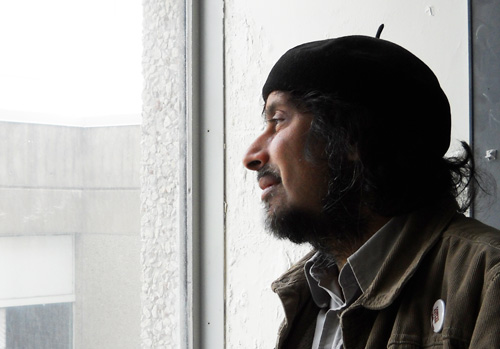
You might not look to musical improvisation for ways to build your corner of the world. But that’s the focus of Ajay Heble’s mingled musical and academic interests. The U of G professor thinks in the key of C, for “community.”
Last month, Heble was one of four panelists at a free public event in Kitchener, Ont., who discussed “Life in 2030” through their varied research projects. The discussion was the inaugural event in a “Research Matters” campaign taking place in several cities early this year.
Last month’s event was hosted by U of G, the University of Waterloo, Wilfrid Laurier University and the University of Ottawa, and introduced by Kevin Hall, U of G vice-president, research.
The campaign is intended to connect university researchers with the general community – a fitting concept for Heble’s theme of musical improvisation as a model for building communities.
Interviewed before the event, the professor in the School of English and Theatre Studies (SETS) discussed two related projects based in Guelph.
Connecting improv and social issues is the idea behind the Improvisation, Community and Social Practice (ICASP) research project directed by Heble. ICASP is now in the sixth year of a seven-year grant from the Social Sciences and Humanities Research Council (www.improvcommunity.ca/).
He is also artistic director and founder of the Guelph Jazz Festival, now in its 20th year. The event brings musicians from around the world for performances and discussions each fall.
In 2009, the festival featured musicians from Mali, Ethiopia, the Netherlands, Mexico, Canada and the United States. Meeting for the first time, the group members had never rehearsed before taking the stage in Guelph.
“They didn’t come and say, ‘We’re going to play in the key of C.’ It was an opportunity to meet for the first time and create wondrous music,” says Heble.
Beyond music, he says, that kind of forum offers ideas for disparate community members facing similar challenges: negotiating differences, fostering trust, meeting social obligations and exercising critical listening skills.
“There’s something going on in the moment when musicians improvise” that might translate to other venues, he says.
There’s also a lesson about co-operating in an increasingly globalized world, he adds. He points to Australian cultural theorist Ien Ang, who poses a question of her own: “How are we to live together in this century?”
There’s togetherness in difference, says Heble. That’s something that resonates with musicians adapting to each other, from an international ensemble put together on the spot to the band The Vertical Squirrels, including Heble, SETS professor Daniel Fischlin and Lewis Melville, a technician in the Department of Molecular and Cellular Biology.
“It’s amazingly exhilarating. It transports me into another world. You never know what’s going to happen.”
Through ICASP, Guelph researchers have forged partnerships with varied groups. Collaborator Pauline Oliveros, a composer and arts professor at the Rensselaer Polytechnic Institute in Troy, NY, has developed a software program that helps people with physical disabilities participate in improvised music-making.
The project also takes music to children and youth through workshops at high schools and with community groups. In 2011, that connection included Toronto musician Jane Bunnett. She spent a year as improviser-in-residence at Guelph through a partnership between ICASP and the Musagetes Foundation.
Other ICASP researchers documented her workshops with youngsters with physical and mental disabilities at the KidsAbility Centre for Child Development in Guelph. That project led to a performance by those children at that year’s jazz festival.
Heble says parents credit the program with instilling new behaviours in their kids. Speaking at Life in 2030, he said, “We know that the research we’re doing matters. We know that it matters because we’re touching people’s lives, we’re reaching groups who rarely get a chance to shine.”
Similar partnerships involve academics at McGill University and the University of British Columbia (UBC) with community groups in Montreal and Vancouver.
Patchen Barss, creative director of the Research Matters campaign in Toronto, says: “It’s research about the relationship between musical improvisation and community-building, and helping people who don’t have a conventional voice to find a voice of their own. I think it’s quite powerful and moving research.”
Now Heble aims to broaden the scope.
A new funding application involves Guelph, McGill and UBC as well as Memorial University of Newfoundland and the University of Regina in proposed programs intended to help spark arts and societal change, including in African countries.
Referring to ICASP, he says, “What we’re doing is unique in the world. We’ve propelled Guelph into a world centre for improvisational music as a form of social practice.”
Research Matters is supported by the Ontario Council of University Research, the Council of Ontario Universities and all of the province’s universities. Other public discussions will take place in Sudbury, Oshawa, St. Catharines and Toronto until early May.
Read more at http://yourontarioresearch.ca/.